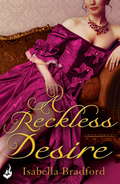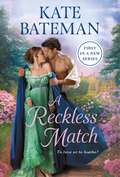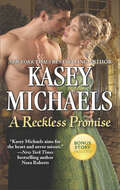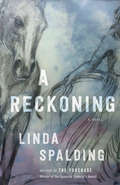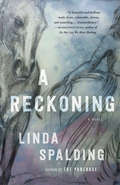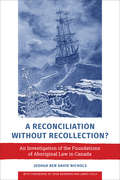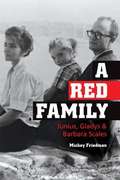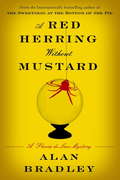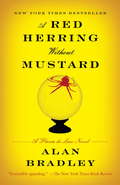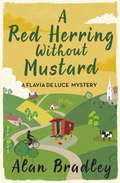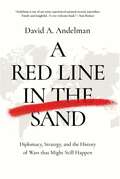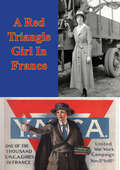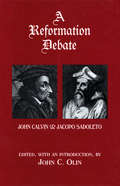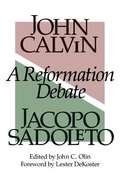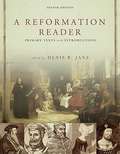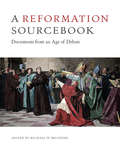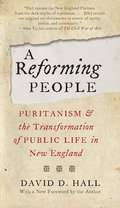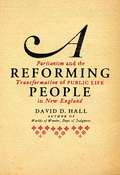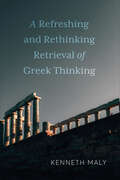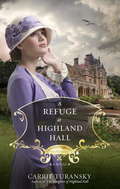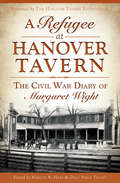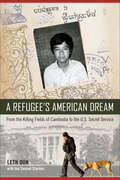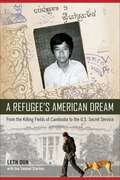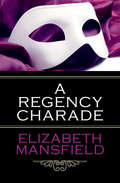- Table View
- List View
A Reckless Desire: Breconridge Brothers Book 3 (Breconridge Brothers)
by Isabella BradfordFor fans of Julia Quinn, Eloisa James and Sarah MacLean, comes Isabella Bradford's enthralling new trilogy of London's most scandalous rakes, the Breconridge Brothers, who are about to lose their hearts...Though charming and handsome, Lord Rivers Fitzroy, the youngest Breconridge brother, is more inclined to dusty books than brazen women. But when his father insists he marries, he vows to make the most of his last days as a bachelor.And what better way than in the company of a troupe of Italian dancers, where he's challenged to a wager he can't resist: turn the players' meek and mousy cousin into the first lady of the London stage.But he gets more than he bargained for with Lucia di Rossi. She has her own past to overcome and her own starlit aspirations. As the lines between performance and passion become blurred will finding the spotlight mean losing their hearts?Catch the rest of the dazzling series! Don't miss A Wicked Pursuit and A Sinful Decption. Before the Breconridge Brothers, came the Wylder sisters. Don't miss a moment of the romantic and captivating debut trilogy from Isabella Bradford: When You Wish Upon a Duke, When The Duchess Said Yes and When The Duke Found Love.
A Reckless Match (Ruthless Rivals #1)
by Kate Bateman"Kate Bateman's writing sparkles." - USA Today bestselling author Laura Lee GuhrkeMeet the Davies and Montgomery families - two households locked in an ancient feud, destined to be on opposing sides forever. Until now...CAN LIFELONG HATEMadeline Montgomery grew up despising––and secretly loving––the roguish Gryffud “Gryff” Davies. Their families have been bitter rivals for hundreds of years, but even if her feelings once crossed the line between love and hate, she’s certain Gryff never felt the same. Now, she’s too busy saving her family from ruin to think about Gryff and the other “devilish” Davies siblings. Since he’s off being scandalous in London, it’s not like she’ll ever see him again...TURN TO TRUE LOVEAs the new Earl of Powys, Gryff Davies planned on spending his post-war life enjoying the pleasures of London. But when an illegal duel forces him to retreat to his family’s Welsh castle, he realizes the only exciting thing in the dull countryside will be seeing the fiery Maddie Montgomery. Thoughts of his nemesis sustained Gryff throughout the war; but the girl he loved to tease has grown into a gorgeous, headstrong woman – who loathes him just as much as she ever did. Will secret tunnels, dangerous smugglers, and meddling from their feuding families be enough to make Maddie and Gryff realize that their animosity is really attraction...and maybe even love?A Reckless Match is the first in a new regency romance series by Kate Bateman about two feuding families, and reunited childhood enemies whose hatred turns to love.
A Reckless Promise (The Little Season #3)
by Kasey MichaelsA nobleman takes in a ward and her beautiful chaperone whom he must keep from falling for in in this Regency romance from a New York Times–bestselling author.It’s the kind of vow often made on the battlefield. Darby Travers, Viscount Nailbourne, never imagines he’ll have to honor it. Yet here she is on his doorstep—his late comrade’s young daughter, and Darby’s new ward. Worse, she comes with the most overprotective, mistrustful, bothersome chaperone—the child’s aunt, Sadie Grace Boxer. Darby is quite sure that behind her lovely facade, the woman is guarding a secret.Sadie Grace faced many trials working in her brother’s surgery, but none prepared her for the world she’s thrust into with his passing. Navigating the ton, with its endless ball gowns and parade of parties, is difficult enough, but hiding the truth about her niece while the sophisticated viscount watches her every move proves nearly impossible—particularly when his searing gaze tempts her to bare all. But when her family’s past catches up with her, she’ll have to trust in Darby—no matter the cost to her heart.“Kasey Michaels aims for the heart and never misses.” —New York Times–bestselling author Nora Roberts
A Reckoning: A Novel
by Linda SpaldingAs the deeply moving and troubling account of a family's breakdown, A Reckoning is the perfect companion to Linda Spalding's bestselling, award-winning novel, The Purchase.It opens in the spring of 1855, when John Dickinson is involved in a shameful secret that will require a tragic decision. The family's resources have been wasted by a reckless brother who holds all of them hostage and, adding fuel to John's desperation, the enslaved workers have been visited by a Canadian abolitionist who pushes them to escape. Bry does, and his pursuit of freedom will involve a dangerous quest to find his mother and child in Canada. Meanwhile, the Dickinsons become fugitives of another kind, escaping their losses in a wagon en route to the West that will eventually be loaded onto a Missouri river boat for a dark adventure. Forests and rivers prevail in this story, and each person will be tested, especially thirteen-year-old Martin, whose lonely journey with a pet bear is almost mythic. Spalding, a Kansas native who lives in Toronto, writes with irresistible force and breathtaking passion. Her language is stunning, her voice unique. A Reckoning confirms her place at the forefront of Canadian literature.
A Reckoning: A Novel
by Linda SpaldingIt’s 1855, and the Dickinson farm, in the bottom corner of Virginia, is already in debt when a Northern abolitionist arrives and creates havoc among the slaves. Determined to find his mother and daughter, who are already free in Canada, Bry is the first slave to flee, and his escape inspires a dozen others. Soon, the farm, owned by one brother and managed by another, is forfeited to the bank.One of the brothers, who is also a circuit-riding preacher, gathers his flock into a wagon train to find a new life in the west. But John Dickinson has a dangerous secret that compels him to abandon the group at the last minute, and his wife, two daughters, and thirteen-year-old son, Martin, now face life on the trail and an unknown future alone. After a fateful encounter along the way, Martin and Bry will hatch a plot to get Bry safely to Canada, but each member of the family will be changed, tormented, excited, and exposed by the journey. Linda Spalding brings an astonishing empathy to the telling of the fate of each of the travelers and to their shifting inner lives—compoundedof grief, fear, anger, and hope. Rich in character and incident, A Reckoning brilliantly-creates an America that was: the undefiled beauty of its lands and the grand mix of settlers and Native Americans; blacks and whites; riverboat captains, small businessmen, and people leaving one life behind for another they can only just begin to see. It moves with irresistible force toward an ending at once cataclysmic, inevitable, and profound.
A Reconciliation without Recollection?: An Investigation of the Foundations of Aboriginal Law in Canada (G - Reference, Information And Interdisciplinary Subjects Ser.)
by Joshua Ben NicholsThe current framework for reconciliation between Indigenous peoples and the Canadian state is based on the Supreme Court of Canada’s acceptance of the Crown’s assertion of sovereignty, legislative power, and underlying title. The basis of this assertion is a long-standing interpretation of Section 91(24) of Canada’s Constitution, which reads it as a plenary grant of power over Indigenous communities and their lands, leading the courts to simply bypass the question of the inherent right of self-government. In A Reconciliation without Recollection, Joshua Ben David Nichols argues that if we are to find a meaningful path toward reconciliation, we will need to address the history of sovereignty without assuming its foundations. Exposing the limitations of the current model, Nichols carefully examines the lines of descent and association that underlie the legal conceptualization of the Aboriginal right to govern. Blending legal analysis with insights drawn from political theory and philosophy, A Reconciliation without Recollection is an ambitious and timely intervention into one of the most pressing concerns in Canada.
A Red Family: Junius, Gladys, and Barbara Scales
by Barbara Scales Mickey FriedmanOne of the few publicly known communists in the South, Junius Scales organized textile workers, fought segregation, and was the only American to be imprisoned under the membership clause of the Smith Act during the McCarthy years. This compact collective memoir, built on three interconnected oral histories and including a historical essay by Gail O'Brien, covers Scales's organizing activities and work against racism in the South, his progressive disillusionment with Party bureaucracy and dogmatic rigidity, his persecution and imprisonment, as well as his family's radicalism and response to FBI hounding and blacklisting. Through the distinct perspectives of Junius, his wife Gladys, and his daughter Barbara, this book deepens and personalizes the story of American radicalism. Conversational, intimate, and exceptionally accessible, A Red Family offers a unique look at the American communist experience from the inside out.
A Red Herring Without Mustard (A Flavia de Luce Novel #3)
by Alan Bradley<P>In the third installment of this bestselling, award-winning, sister-poisoning, bicycle-riding, murder-investigating, and utterly captivating series, Flavia de Luce must draw upon Gypsy lore and her encyclopaedic knowledge of poisons to prevent a grave miscarriage of justice. "You frighten me," the old Gypsy woman says. "Never have I seen my crystal ball so filled with darkness." <P>So begins eleven-year-old Flavia de Luce's third adventure through the charming but deceptively dark byways of the village of Bishop's Lacey. The fortune teller also claims to see a woman who is lost and needs help to get home--and Flavia knows it must be her mother Harriet, who died when Flavia was less than a year old. The Gypsy's vision opens up old wounds for our precocious yet haunted heroine, and sets her mind racing in search of what it could mean. <P>When Flavia later goes to visit the Gypsy at her encampment, she certainly doesn't expect to find the poor old woman lying near death in her caravan, bludgeoned in the wee hours. Was it an act of retribution by those who thought that the woman had abducted a local child years before? <P>Certainly Flavia understands the bliss of settling scores; revenge is a delightful pastime when one has two odious older sisters. But how can she prove this crime is connected to the missing baby? Did it have something to do with the weird sect who met at the river to practice their secret rites? <P> While still pondering the possibilities, Flavia stumbles upon a corpse--that of a notorious layabout and bully she had only recently caught prowling about Buckshaw. The body hangs from a statue of Poseidon in Flavia's very own backyard, and our unflappable sleuth knows it's up to her to figure out the significance. <P>Pedalling her faithful bicycle, Gladys, across the countryside in search of clues to both crimes, Flavia uncovers secrets both long-buried and freshly stowed--the dodgy dealings of a local ironworks, the truth behind the Hobblers' secret meetings, her own ancestor's ambitious plans--all the while exhausting the patience of Inspector Hewitt. But it's not long before the evidence starts falling into place, and Flavia must take drastic action to prevent another violent attack.
A Red Herring Without Mustard: A Flavia de Luce Novel (A Flavia de Luce Novel #3)
by Alan Bradley<P>Alan Bradley, author of the most award-winning series debut of any year, returns with another irresistible Flavia de Luce novel. <P> In the hamlet of Bishop's Lacey, the insidiously clever and unflappable eleven-year-old sleuth Flavia de Luce had asked a Gypsy woman to tell her fortune--never expecting to later stumble across the poor soul, bludgeoned almost to death in the wee hours in her own caravan. Was this an act of retribution by those convinced that the soothsayer abducted a local child years ago? <P>Certainly Flavia understands the bliss of settling scores; revenge is a delightful pastime when one has two odious older sisters. But how could this crime be connected to the missing baby? As the red herrings pile up, Flavia must sort through clues fishy and foul to untangle dark deeds and dangerous secrets. <P><b>A New York Times Bestseller</b>
A Red Herring Without Mustard: The gripping third novel in the cosy Flavia De Luce series (Flavia de Luce Mystery #Bk. 3)
by Alan BradleyWelcome to Bishop's Lacey. A murder every country mileFor eleven-year-old Flavia de Luce, a visit to a Gypsy fortune-teller is just a bit of fun - until the old woman claims to see a vision of Flavia's mother, who died when Flavia was a baby. When the Gypsy is brutally attacked, Flavia wonders if her appearance in the village has stirred up memories of a tragic event from the past.Flavia starts down a dark and twisting road to discover the truth - but when a corpse is found in the grounds of Buckshaw, the de Luce family seat, it seems as if the heart of the mystery is disturbingly close to home. Praise for the historical Flavia de Luce mysteries: 'The Flavia de Luce novels are now a cult favourite' Mail on Sunday 'A cross between Dodie Smith's I Capture The Castle and the Addams family...delightfully entertaining' Guardian Fans of M. C. Beaton's Agatha Raisin, Frances Brody and Alexander McCall Smith will enjoy the Flavia de Luce mysteries: 1. Sweetness at the Bottom of the Pie 2. The Weed That Strings the Hangman's Bag 3. A Red Herring Without Mustard 4. I Am Half Sick of Shadows 5. Speaking From Among the Bones 6. The Dead in Their Vaulted Arches 7. As Chimney Sweepers Come To Dust 8. Thrice the Brinded Cat Hath Mew'd 9. The Grave's a Fine and Private Place If you're looking for a cosy crime series to keep you hooked then look no further than the Flavia de Luce mysteries. * Each Flavia de Luce mystery can be read as a standalone or in series order *
A Red Line in the Sand: Diplomacy, Strategy, and the History of Wars That Might Still Happen
by David A. AndelmanA longtime CNN columnist astutely combines history and global politics to help us better understanding the exploding number of military, political, and diplomatic crises around the globe.The riveting and illuminating behind-the-scenes stories of the world's most intense &“red lines," from diplomatic and military challenges at particular turning points in history to the ones that set the tone of geopolitics today. Whether it was the red line in Munich that led to the start of the Second World War, to the red lines in the South China Sea, the Korean Peninsula, Syria and the Middle East. As we traverse the globe, Andelman uses original documentary research, previously classified material, and interviews with key players, to help us understand the growth, the successes and frequent failures that have shaped our world today. Andelman provides not just vivid historical context, but a political anatomy of these red lines. How might their failures be prevented going forward? When and how can such lines in the sand help preserve peace rather than tempt conflict? A Red Line in the Sand is a vital examination of our present and the future—where does diplomacy end and war begin? It is an object lesson of tantamount importance to every leader, diplomat, citizen, and voter. As America establishes more red lines than it has pledged to defend, every American should understand the volatile atmosphere and the existential stakes of the red web that encompasses the globe.
A Red Triangle Girl In France
by AnonThe amusing anonymously written letters of a YMCA canteen girl recounting her life serving the Doughboys of the First World War. As her mother who collected and published the letters explains:"May I in a few words explain why I have placed at your disposal the accompanying manuscript? It consists of selections from the home letters of our daughter, written in a Y.M.C.A. canteen "Somewhere in France." They were dashed off rapidly, in busy days, with many interruptions, addressed to members of our family circle; and they bear on their face everywhere the stamp of having been written without pre-meditation or the remotest dream of publication."But they tell the story of the daily life in a crowded canteen in France, as experienced by an intensely interested and enthusiastic participant, not only in its outward form, but also in its innermost spirit. The infinite variety of the life, its humour, its pathos, its confidences, its noble, its generous, its picturesque characters, its delights and its privations, its devotions and its gratitudes, its tragedies and its sorrows, the countless services and the priceless spirit of the Y.M.C.A. workers, all this and much more is disclosed in these vivid letters with an art that is wholly unconscious and to which the thought of publication would have been fatal."
A Reformation Debate: John Calvin & Jacopo Sadoleto
by John C. OlinIn 1539, Cardinal Jacopo Sadoleto, Bishop of Carpentras, addressed a letter to the magistrates and citizens of Geneva, asking them to return to the Roman Catholic faith. John Calvin replied to Sadoleto, defending the adoption of the Protestant reforms. Sadoleto’s letter and Calvin’s reply constitute one of the most interesting exchanges of Roman Catholic/Protestant views during the Reformationand an excellent introduction to the great religious controversy of the sixteenth century. These statements are not in vacuo of a Roman Catholic and Protestant position. They were drafted in the midst of the religious conflict that was then dividing Europe. And they reflect too the temperaments and personal histories of the men who wrote them. Sadoleto’s letter has an irenic approach, an emphasis on the unity and peace of the Church, highly characteristic of the Christian Humanism he represented. Calvin’s reply is in part a personal defense, an apologia pro vita sua, that records his own religious experience. And its taut, comprehensive argument is characteristic of the disciplined and logical mind of the author of The Institutes of the Christian Religion.
A Reformation Debate: Sadoleto's Letter to the Genevans and Calvin's Reply
by Jacopo Sadoleto John CalvinThe reformation controversy over justification and church authority is presented through primary sources: historic letters between John Calvin and Cardinal Sadoleto.
A Reformation Reader: Primary Texts And Introductions, 3rd Edition
by Denis R. JanzAlthough deeply political, economic, and social, the European Reformations of the sixteenth century were at heart religious disputes over core Christian theological issues. Denis Janz's A Reformation Reader is unabashed in its generous selection of key theological and related texts from five distinct Reformation sites. The late-medieval background is richly discussed and the Lutheran, Calvinist, Radical, English, and Catholic Reformations are all thoroughly presented. A classroom staple for nearly 30 years, this new third edition of the text takes into account the needs of the contemporary classroom for primary source readings that are concise and focused on the subject matter at hand. Over 100 carefully selected primary documents are edited for even greater concision and capture the energy and moment of that tumultuous time. The saving of space results in a shorter, more tightly presented book that now includes even more readings! Students and teachers alike will appreciate the expanded range and fresh focus of this classic reader.
A Reformation Reader: Primary Texts with Introductions
by Denis R. Janz* More than 100 carefully edited primary Refomation documents *Key theological writings from Luther, Calvin, Zwingli, and more * Companion Web site features professor-and student-friendly resources
A Reformation Sourcebook: Documents From An Age Of Debate
by Michael W. BrueningDuring the Reformation, Europeans were engaged in a debate that would alter the course of European history. This debate was about how to understand and practice the Christian faith. Never before had so many people weighed in on a topic of such importance. This book presents the debates of the Reformation era through over eighty primary sources. Some of the documents present formal debates. Others represent informal debates or disputes, with one text responding directly to the other. Still other sections present texts that offer divergent approaches to or perspectives on specific ideas. These too were part of the century-long debate that characterized the Reformation. The author provides an essay on how to read primary sources. Each chapter opens with a brief introduction, and each group of primary sources is preceded by information on historical context as well as focus questions. Further readings are provided at the end of each chapter, and a map of Europe divided by religions is included.
A Reforming People
by David D. HallIn this revelatory account of the people who founded the New England colonies, historian David D. Hall compares the reforms they enacted with those attempted in England during the period of the English Revolution. Bringing with them a deep fear of arbitrary, unlimited authority, these settlers based their churches on the participation of laypeople and insisted on "consent" as a premise of all civil governance. Puritans also transformed civil and criminal law and the workings of courts with the intention of establishing equity. In this political and social history of the five New England colonies, Hall provides a masterful re-evaluation of the earliest moments of New England's history, revealing the colonists to be the most effective and daring reformers of their day.
A Reforming People: Puritanism And The Transformation Of Public Life In New England
by David D. HallA revelatory account of the aspirations and accomplishments of the people who founded the New England colonies, comparing the reforms they enacted with those attempted in England during the period of the English Revolution. Distinguished historian David D. Hall looks afresh at how the colonists set up churches, civil governments, and methods for distributing land. Bringing with them a deep fear of arbitrary, unlimited authority grounded in either church or state, these settlers based their churches on the participation of laypeople and insisted on "consent" as a premise of all civil governance. Encouraging broad participation and relying on the vigorous use of petitioning, they also transformed civil and criminal law and the workings of courts. The outcome was a civil society far less authoritarian and hierarchical than was customary in their age--indeed, a society so advanced that a few dared to describe it as "democratical." They were well ahead of their time in doing so.As Puritans, the colonists also hoped to exemplify a social ethics of equity, peace, and the common good. In a case study of a single town, Hall follows a minister as he encourages the townspeople to live up to these high standards in their politics. This is a book that challenges us to discard long-standing stereotypes of the Puritans as temperamentally authoritarian and their leadership as despotic. Hall demonstrates exactly the opposite. Here, we watch the colonists as they insist on aligning institutions and social practice with equity and liberty.A stunning re-evaluation of the earliest moments of New England's history, revealing the colonists to be the most effective and daring reformers of their day.From the Hardcover edition.
A Refreshing and Rethinking Retrieval of Greek Thinking (New Studies in Phenomenology and Hermeneutics)
by Kenneth MalyA Refreshing and Rethinking Retrieval of Greek Thinking presents a rereading and rethinking of Greek philosophy in an attempt to retrieve an essential thread in Greek thinking that has been covered over for many centuries – beginning with the late Greeks, then Christianity, and then rationalism – and misrepresented by mistranslations from the seventeenth century onward . Using Heidegger’s work with Greek thinking as a springboard, the book shows how the covering over of this essential thread happened. Kenneth Maly provides a frame by which those not trained in philosophy and phenomenology of experience can grasp the wider import of this rethinking of Greek philosophy. The book delves deep into key questions, preparing readers for extensive and more technical work with the key Greek words and their meanings, hidden for centuries. It includes a significant investigation of how this task requires a different way of language, how early Western thinking mirrors non-Western Daoism and Buddhism, and how quantum physics gets to the same place in its "philosophy," with an emphasis on the work of David Bohm. In doing so, the book reveals how Daoism, Buddhism, the quantum potential of quantum physics, and Heidegger’s being-beyng are all mirrored in Greek philosophy, above all in early Greek thinking.
A Refuge at Highland Hall
by Carrie TuranskyThe Great War shakes the world of a spirited young woman and the brave British pilot she loves, taking her from London to her family's magnificent country estate, and sending him into the war-torn skies over France. Penny Ramsey has always considered Highland Hall her home, but when Britain becomes involved in World War One she travels to London to assist her sister Kate with the eight orphan children she and her husband Jon have taken into their home. Doing her part for the war effort takes priority over Penny's dreams of romance until she meets Alex Goodwin, a Royal Naval Air Service pilot in training. Alex is determined to prove his worth and do his part to defend his country. Knowing he is heading off for the dangerous assignment of chasing Zeppelins across the front line in France, he feels it's unwise to form any romantic attachments. But he can't help admiring the pretty, warmhearted Penny and wondering what it would be like to find her waiting when he returns home from the war. As Penny writes to Alex, their friendship blossoms, and she becomes his tie to home and normalcy as he faces the hardships war. But being an RNAS pilot means confronting the enemy, and the fallout form those experiences push Alex beyond Penny's reach. Can God mend the brokenness left by the losses of war? Will faith and forgiveness bring them together again?From the Trade Paperback edition.
A Refugee at Hanover Tavern: The Civil War Diary of Margaret Wight (Civil War Ser.)
by The Hanover Tavern FoundationAn account of life on the home front written by a Southern woman trying to survive the daily struggles of the Civil War. The Hanover Tavern outside Richmond was a place of refuge during the Civil War. Life at the Tavern was not always safe as residents weathered frequent Union cavalry raids on nearby railroads, bridges, and farms. Margaret Copland Brown Wight and some of her family braved the war at the Tavern from 1862 until 1865 in the company of a small community of refugees. She kept a diary to document each hardship and every blessing—a day of rain after weeks of drought, news of her sons fighting in the Confederate armies, or word from her daughter caught behind enemy lines. Wight&’s diary, discovered more than a century after the war, is a vital voice from a time of tumult. Join the Hanover Tavern Foundation as the diary is presented here for the first time. Includes photos
A Refugee's American Dream: From the Killing Fields of Cambodia to the U. S. Secret Service
by Leth OunAfter barely surviving the horrors of the Killing Fields of Cambodia as a child, Leth Oun spent almost four years in refugee camps before immigrating to America, where he persevered to become an officer in the United States Secret Service.
A Refugee's American Dream: From the Killing Fields of Cambodia to the U.S. Secret Service
by Leth Oun“I saw many killed. I almost starved. But I escaped to refugee camps in Thailand and eventually made it to the U.S.” Thus begins Leth Oun’s poignant and vivid memoir. A survivor of the Cambodian Killing Fields—having spent a torturous three years, eight months, and ten days imprisoned by the Khmer Rouge—Oun thrived in America, learning English, becoming a citizen, and working as an officer in the United States Secret Service Uniformed Division. In A Refugee’s American Dream, Oun shares hard memories of Cambodia, where his father was executed, and his family enslaved in labor camps. Following the fall of the Khmer Rouge, Oun survived a year of homelessness then nearly four years in refugee camps. Arriving in America, 17 and penniless, Oun struggled, washing dishes at a Chinese restaurant for $3.15 an hour. Still, he persevered, graduating from Widener University and completing thousands of hours of training to pursue a career in the Secret Service. While on President Obama’s protection team, he returns to Cambodia after 32 years, reunites with family, and bonds with Reik, the Secret Service dog he handles. Through his most difficult moments, Oun displays truly inspiring resilience that ultimately leads to great achievements. The authors’ proceeds will go to help Cambodians in need
A Regency Charade
by Elizabeth MansfieldA daring charade could reunite a husband and wife in award-winning author Elizabeth Mansfield&’s sparkling Regency romance After nearly losing his life at the Battle of Waterloo, Captain Alexander Tyrrell, Earl of Braeburn, comes home to the shocking news that he is still married. Braving enemy fire is nothing compared to having to see the duplicitous Priscilla Vickers again. Priss has waited six years to be reunited with the man she loves. But her husband believes her guilty of the worst kind of betrayal. And nothing she says or does will convince him that Sir Blake Edmonds isn&’t her illicit lover. It will take a daring deception—and a scheming minx who has set her cap for Alec—for these two people to realize how much they have lost and how much they could gain if they were to find the courage to turn a sham union into a second chance for happiness.
